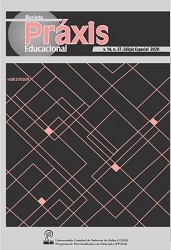MODELLING THEORY OF MIND, DIVERGENT THINKING AND MATHEMATICAL PROBLEM POSING OF FIRST GRADERS
DOI:
https://doi.org/10.22481/praxisedu.v16i37.6158Keywords:
Mathematical education, Problem posing, Divergent thinking, Theory of mindAbstract
Purpose: Problem posing has a central importance in the discipline of mathematics and in the nature of mathematical thinking. The purpose of this study was to investigate the explanatory and predictive relationships among the variables of the theory of mind, divergent thinking, and problem posing in the first grade students of elementary school, using structural equation modeling approach. Method: The subjects are 345 students (176 girls and 169 boys) of the first graders of elementary school of Zahedan, using available sampling model. They lived and were educated in the average, urban areas
of the city. Students responded to the theory of mind, divergent thinking, and mathematical problem posing tests. Structural Equation Modeling was used to analyze the data gathered survey instrument. Findings: The data analysis revealed a significant (P<0.05) impact of divergent thinking variable on the outcome of problem posing skills. Interestingly, an indirect impact of theory of mind variable via divergent thinking on the problem posing variable were observed in this study. These findings clearly demonstrated the positive impacts of the components of divergent thinking and theory of mind on the mathematical problem posing. Implications for Research and Practice: remains necessary to further explore the role of mind on the problem posing ability with regard to mathematical education.
Downloads
References
Blazis P.P. (1987). Analysis of the state of mental discomfort in students dis .... cand. psychol. sciences. Leningrad, 182 p.
Geymans G. (1971). Psychology of a woman. SPb., 248 p.
Groysman AA (1988). Psychotherapeutic methods in the system of prophylaxis of neurotic disorders in students: Dis. ... Dr. honey. Science. L.,
Dubchak G.M. (2000). Intrapersonal conflicts of students during their studies at the university: Abstract. dis. ... cand. psychol. Sciences: Chernivtsi, 19 p.
Klimov E.A. (1996). Psychology of professional self-determination. M., 512s.
Kon I.S. (1975). Sexual differences and differentiation of social roles. In the book: Correlation of biological and social in a human being / Materials for a symposium in Moscow. M .: Enlightenment, p. 46
Kondratiev M.Yu. (1987). Management of the teaching staff. In the book .; Social Psychology: A manual for pedagogical universities. M .: Progress, p. 48
Kolesov D.V. (1980). Conversations about sex education. M .: Pedagogy, 102 p.
Kudryavtsev T.V. (1981). Psychological and pedagogical problems of higher education // Questions of Psychology, No. 2, p. 20-30
Lisovsky V.T., Dmitriev A.V. (1974). Student personality L.: Leningrad State University Publishing House, 184 p.
Markova AK (1996). Psychology of professionalism. M.: Education. 308 p.
Mukhina B.C. (1999). Phenomenology of the development and existence of personality. M., - V oronezh, 344 p.
Madorskaya S.M. (1986). The problem of social adaptation of students to the educational process: Dis. ... cand. philosopher, sciences. Minsk, 239 p
Stolin V.V. (1983). Self-identity. M .: Moscow Publishing House. university, 585 p.
Yanitsky M.S. (1995). The main psychological mechanisms for the adaptation of students to educational activities: Dis. ... cand. psychol. sciences. Kemerovo, 180 p.
Downloads
Published
Issue
Section
License
Você é livre para:
Compartilhar - copia e redistribui o material em qualquer meio ou formato; Adapte - remixe, transforme e construa a partir do material para qualquer propósito, mesmo comercialmente. Esta licença é aceitável para Obras Culturais Livres. O licenciante não pode revogar essas liberdades, desde que você siga os termos da licença.
Sob os seguintes termos:
Atribuição - você deve dar o crédito apropriado, fornecer um link para a licença e indicar se alguma alteração foi feita. Você pode fazer isso de qualquer maneira razoável, mas não de uma forma que sugira que você ou seu uso seja aprovado pelo licenciante.
Não há restrições adicionais - Você não pode aplicar termos legais ou medidas tecnológicas que restrinjam legalmente outros para fazer qualquer uso permitido pela licença.












